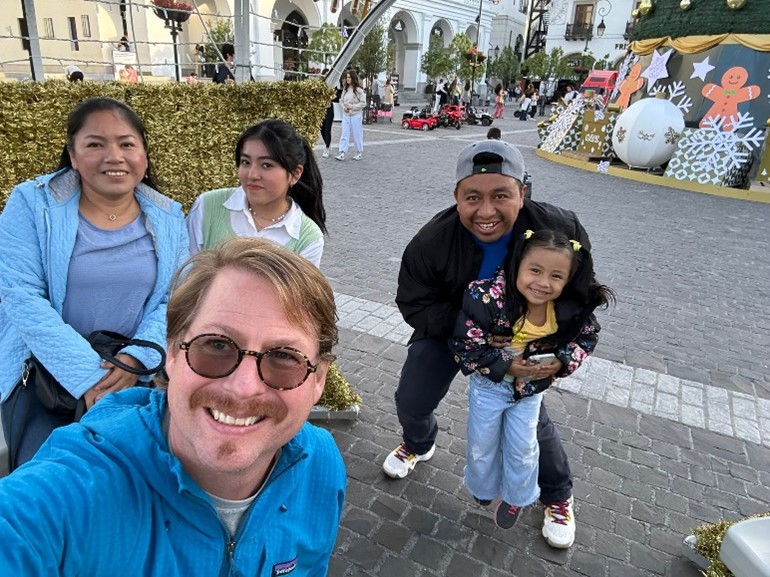In December 2023, Winston K. Scott, Ph.D., the Director of the Mayan Languages Digitization and Preservation Project, journeyed to Guatemala on a mission of community outreach and collaboration, sponsored by MasterWord Institute. Look behind the scenes at the work being done.
December 12. From 30,000 feet, the morning clouds surrounding the volcanoes on approach to Guatemala City never fail to impress those whom they greet. The huge volcanoes also serve as a reminder of the ambitious project we undertake that brings me to Guatemala on this journey; the need to bring the beautiful languages and cultures of this cradle of the Maya civilization into the digital age, one word at a time.
Mayan Languages Digitization and Preservation Project
The Mayan Languages Digitization and Preservation Project is a pioneering initiative dedicated to preserving and promoting the Mayan languages. Through an online, open-source glossary and collaboration with technology partners, the project aims to empower Mayan communities by bridging the digital divide and providing access to essential information, education, healthcare, and legal services.
Rare Books from Cholsamaj Publishing

I was honored to meet with the director of Cholsamaj publishing house on my first day in Guatemala City, Kikab’ Gerber Mux. A man of considerable education and insight, Kikab’ was able to provide us with wonderful resources in the form of published works in numerous Mayan languages. Beyond that, we were able to discuss a collaborative partnership to elevate the digital and printed presence of Mayan languages of Guatemala, to which he and his organization are dedicated. This visit afforded us the opportunity to procure numerous rare books written in K’iche’, Q’eqchi’, Mam, Chuj, and others that are already proving to be invaluable resources for the Mayan digitization effort and beyond.
Educational Outreach: The Centro Tecnológico Bilingüe
Day two in Guatemala provided an opportunity to discuss how we can work with existing institutions of learning to create critical data in Mayan languages.
I shared a wonderful morning meeting with Lister Garcia Hun, the Director of the Centro Tecnológico Bilingue, a bilingual K-12 educational initiative where native Q’eqchi’ Mayan language speakers are receiving bilingual instruction in Q’eqchi’ and English. When the meeting ended, I was left with an enthusiasm to add to the school’s existing curriculum and incorporate a test model by which high school level students become contributors to the digitization effort. Doing so in an educational environment allows them to preserve and maintain their native language in an on-line format while also improving their English proficiency. We envision this as a pilot program that we can use in the other Mayan language communities to engage bilingual institutions to increase awareness of digitization efforts and the kind of data that we gather and create for the project.

Engaging Rural Communities: Mayan Radio
One of the more exciting potential collaborations from this journey was made the following day as I visited the Federation for Radiophonic Schools of Guatemala (FGER in Spanish). FGER, led by its director, Walter Emilio Cuc, is a federation that broadcasts radio programming throughout the country in many of the Mayan languages of Guatemala. Radio is a principal medium available to rural areas, where most of the Mayan language communities are located. As such, I view this collaboration as essential in terms of community outreach, gathering extensive spoken data, and collaborating to create programming, delivered via traditional radio broadcasting and internet, that is both culturally relevant and educational for the communities with who we work.
Later that evening, I was able to do some team building with one of our valued moderators, Pedro Tambriz Och and his beautiful family.


Insights from Kaqchikel Experts
The following day I traveled to Antigua, Guatemala to meet with a Kaqchikel author, Maya Spiritual Guide, and language teacher, Kawoq Baldomero Cuma. We shared the morning talking over coffee of his impressions of the digitization project and his desire to publish more of his written works in his native Kaqchikel. An extremely thoughtful and intelligent gentleman, Kawoq has worked with scholars from Tulane University, The University at Albany, SUNY, and Vanderbilt University as a Kaqchikel language teacher. He also has extensive teaching credentials as part of the Oxlajuj Äj Kaqchikel Language School, which is directed and run by Professor Judith Maxwell, Tulane University.

Of the more memorable days of my journey, I was able to spend time with the family of our Kaqchikel moderator, Deky Per, in Patzicía, Guatemala. Deky’s family prepared a local delicacy named Pulik, a. delicious stew of meat and vegetables and accompanied by chilé peppers and corn tamales. Deky’s father, Martín, is an accomplished translator for Kaqchikel and speaks Tz’utujil. Mr. Per provided me with more written resources in Kaqchikel and was more than happy to make himself available to contribute to our work. The warmth and kindness of the Per Family reinforced one of the core goals of our project and the larger MasterWord community: Doing business with heart. I am humbled by and grateful to this family’s generosity and welcome into their home.
Reflecting on Progress and Future Aspirations
As this journey ended, I left confident that we were able to accomplish significant headway in the areas of community outreach and collaboration. Furthermore, having had to organize and pack up a library of rare books that are written in various Mayan languages, I left with an increased level of excitement for having taken the project to these collaborators and having sowed the seeds of what we see as a long-term collaborative effort. Although it is always hard to leave Guatemala because of the relationships which we form, both old and new, I return with more hope and surety than ever before that our work is on the right path and that our goals are within reach to elevate these incredible languages and their communities and to march forward to digitize their languages in a way that contributes to all speakers and their communities and the global community.

Winston K. Scott, Ph.D.
Director, The Mayan Languages Digitization and Preservation Project